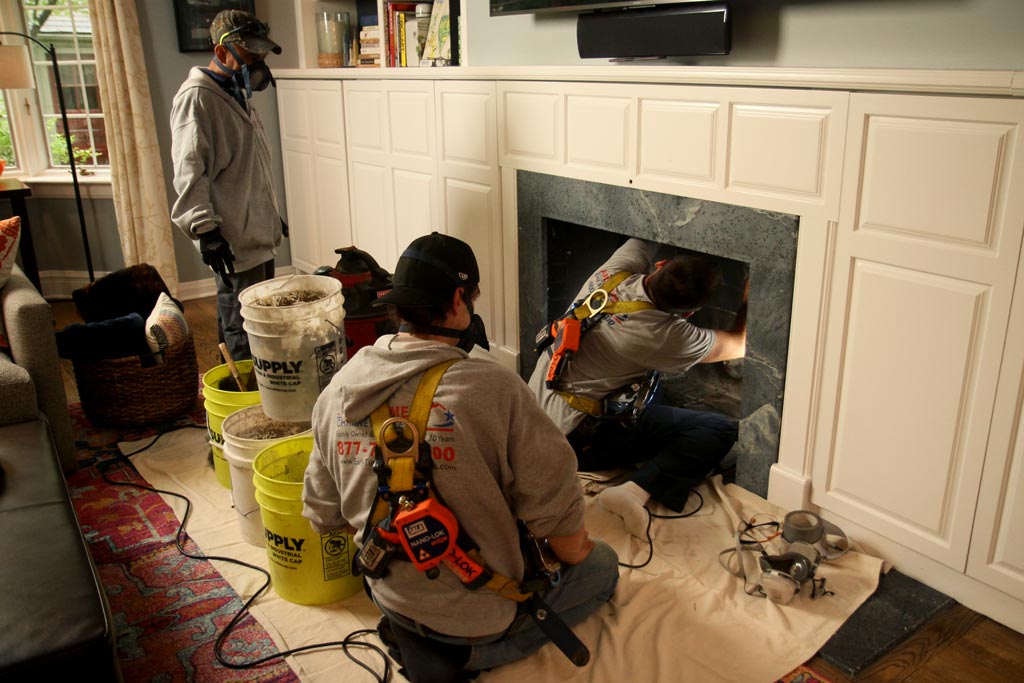How to make sure your fireplace is ready for winter?
 On a winter evening, there is nothing like cozying up to a glowing fireplace. A crackling fire sets the mood for a gathering of friends and family enjoying tasty food, holiday music and warm conversation, or for a relaxing moment with a cup of cocoa and a good read. But whether yours is a wood-burning or gas-burning fireplace, each works safest and best with proper maintenance and care.
On a winter evening, there is nothing like cozying up to a glowing fireplace. A crackling fire sets the mood for a gathering of friends and family enjoying tasty food, holiday music and warm conversation, or for a relaxing moment with a cup of cocoa and a good read. But whether yours is a wood-burning or gas-burning fireplace, each works safest and best with proper maintenance and care.
What are the different types of fireplaces?
Gas Fireplaces
Gas-burning fireplaces are the way to go if you want the convenience of a fireplace but not the chore of cleaning it. These fireplaces just need basic maintenance andare very easy to use. What you need to do is flip the ignition on, and it's ready for you to go. You don't have to think about burning wood for smoke, soot, daily washing and other tasks. The only problem with these fireplaces is the risk of dangerous gas leakages, that is, if they are not properly equipped.

Wood Burning Fireplaces
Wood burning fireplaces are the perfect option if you enjoy hearing the crackling sound of burning wood. Wood burning fireplaces are the traditional fireplaces and offer an antique feel to your space and make up an integral part of your integral decor.
In contrast to gas burning fireplaces, the most notable benefit of wood burning fireplaces is their low maintenance expense. This is primarily due to the low cost of wood. However, these fireplaces need the most attention and maintenance. You should also invest in a safety screen to prevent flying embers from making a mess and for the safety of your family.

What are the 7 steps of getting your fireplace ready for winter?
Clean the Chimney
The most important part of preparing your fireplace for winter is to make sure it’s clean. When your chimney sweep fills with soot, it can become a fire hazard and even give you carbon monoxide poisoning. At least once a year, your fireplace should be cleaned. If you’re unsure of how to tackle the cleaning yourself, you can always hire a professional chimney sweeper.
Wood Preparation
With the day's becoming colder and shorter, it’s always a good idea to prepare your firewood as soon as possible. This way you can store chopped firewood in a dry place and collect logs as they are required.

Clean The Fireplace
After your chimney sweep has been cleaned, we recommend cleaning the fireplace as well. Clear any soot or twigs that might still reside inside your fireplace, this gives it a fresh start for the new season. If you’re not sure how to clean your fireplace, we have a complete guide here.
Check the Damper
Make sure you inspect the fireplace from the outside, in. From the inside, you need to make sure the damper opens and closes properly and it securely fits in the brackets. If the damper is not right, you might end up losing a lot of heat which would result in a waste of wood and energy. Before inspecting, please make sure you have goggles on as the damper might have accumulated creosote and soot.
Ensure a Clear Passage
If you want to take on your chimney sweep and clean yourself, you’ll have to make sure the chimney is clear of any bird nests or animals that might have taken shelter. Chimneys and fireplaces are ideal for small animals to nest in. To ensure the passageway is clear, you must be able to see daylight from underneath the fireplace. Remember to be responsible and wear appropriate clothing, protection equipment and use safety gear, especially while working on the roof.

Check for Cracks and Damage
Check for firebrick cracks and loose joints inside the fireplace, and check for damage to the exterior of the masonry. Never attempt to restore firebrick with standard mortar, as the mixture does not stand up to high temperatures. Hire a licenced mason to make any repairs.
Test the mortar in the chimney or surround for gaps on the bricks. These can, if not fixed, trigger dangerous fires. When you notice significant cracks in either the bricks or the mortar, you might need to call in a professional.
Test Run
Once all the main inspections are done and you have deemed the fireplace to be in a perfect condition to work, light it up and give it a try. Testing the fireplace and chimney beforehand will save you a lot of trouble instead of lighting it up in the winter and realizing that it doesn’t work. This way you will be able to check the ignition, the damper, the exhaust, and the heat expenditure. Prepping beforehand is the key to making sure that your fireplace is ready for the winter season!
Need help cleaning your chimney sweeps? Click the button below to get free no obligation quotes from our local chimney sweep cleaners today at service.com.au.